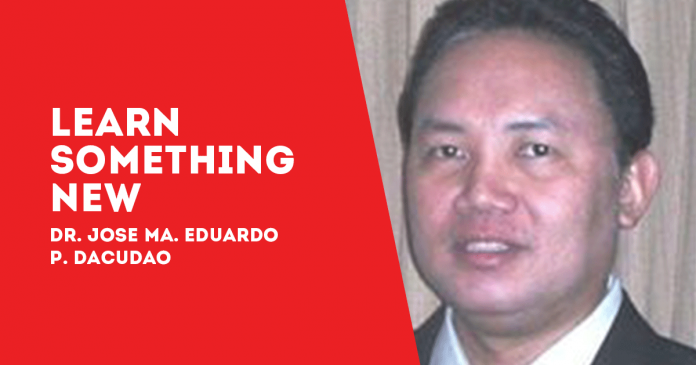
BY JOSE PALU-AY DACUDAO
“THE MONTH of the National Language is the Month of the Languages of the Philippines.”
This is the statement being promoted in all Philippine schools this month of August, another so-called “Buwan ng Wikang Pambansa”.
What is this National Language Month anyway?
On July 15, 1997, then President Fidel Ramos signed Proclamation 1041 designating August as the “Buwan ng Wikang Pambansa”.
Upon what rationale is this proclamation based?
The proclamation uses several key words.
1. Unity in Uniformity (‘kaisahan’)
This proclamation specifically mentions that a single native national language is important for the nation’s unity (‘kaisahan’).
False. We have always been diverse. With about 160 languages, the Philippines ranks among the world’s most culturally diverse countries. These languages have been present before there was a Philippines and certainly have a right to exist, whether there is a Philippines or not. They PRE-DATE the Philippines. They are part of the present Philippines. A vision of what the Philippines should be should not include the idea of destroying them.
What we should be advocating is UNITY IN DIVERSITY. Only in Federalism can we truly achieve that, not in Tagalog Language Nationalism. (Language Nationalism, the idea of a nation based on one language, has gone passé in many Federal countries of the world today.)
2. Economic Prosperity (‘kaunlaraan’ = kauswagan in Binisaya)
False. Federal countries that often recognize their diverse ethno-linguistic heritage are generally more economically prosperous than their neighboring Unitarian neighbors.
Besides, what has the promotion of Tagalog (honey coated as ‘Filipino’) done for us Visayans? Certainly, nothing economically progressive.
If anything, the displacement of English by Tagalog in our educational system has just damaged our standards in the Sciences and is taking away a language that our overseas workers need for the gainful employment that is sustaining much of our economy. Without their remittances, our economy would be in danger of collapsing.
I say, if the Tagalistas would like to impose Tagalog in our schools, let them displace English with it and impose it in the schools of the traditional Tagalog provinces. Let them ruin the Tagalogs’ Science standards and the employment chances of their overseas workers.
Probably, even most of the Tagalogs would not consent to this economic sabotage of their provinces. Te ngaa haw idalahig pa kita iya nga mga Bisaya sang ila nga binuang?
The imposition of Tagalog in our schools has absolutely no economic benefit for us Visayans (and the rest of the non-Tagalog Peoples of the Philippines). It is actually bad for our economy, and its true aim is to kill our identities and turn us into Tagalogs.
3. Communication (“Komunikasyon”) and understanding (“Unawaan”)
English has been the sociologically leveling language in the Philippines since more than a hundred years ago. (The idea of a neutral leveling tongue is quite acceptable in many parts of Africa and the Indian subcontinent.) Filipinos have been communicating and understanding each other using English during all this time.
As a leveling tongue, the use of English also imparts a sociological equality among the Philippines’ different ethnic peoples. If a Visayan and a Tagalog were to communicate in English, they would be sociological equals.
If the State insists that Tagalog (honey-coated as ‘Filipino’) is the national language, then the Visayan automatically acquires a minority social status, and the Tagalog a majority social status. The Visayan becomes a second-class citizen in his own country.
Far from fostering mutual understanding between Philippine ethnic peoples, the so-called ‘National Language’ has just fostered arrogance and chauvinism among the Tagalogs, and an inferiority complex and colonial mentality among non-Tagalogs.
The end result of an unchecked implementation of this proclamation is naturally the extinction of English in our schools and its replacement with Tagalog. The Japanese who started all this in World War II in fact did this quite openly. They immediately erased English and replaced it with Tagalog and Japanese. Why on earth should we wish to continue this legacy of Japanese colonialism?
4. Autonomy (“Kasarinlan”)
Apparently the proclamation pre-supposes that ‘autonomy’ from English is ‘good’. I myself have difficulty comprehending this rationale. If one really wishes autonomy for our peoples, then one does not impose the language of internal colonialism (the language of Imperial Manila) on them. One promotes their regional languages.
5. Honoring Manuel Quezon
President Manuel Quezon, born on Aug. 19, 1878, was dubbed the ‘Father of the National Language’. This baloney could only be believed by people who have been brainwashed by the Philippine Educational system.
Quezon himself, in his own writings, envisioned a Philippines wherein every Filipino spoke Tagalog. He was a real adherent of the ideology of Unity in Uniformity, of Tagalog Nationalism.
That would be fine if you were a Tagalog. If you are not, then from the point of view of your ethnic people, Quezon’s vision is an unmitigated disaster. Your ethnic people would be wiped out.
Only a Tagalista would think that such ethnic cleansing is ‘good’, even after being shown that the end result of such policy is the extinction of the non-Tagalog peoples of the Philippines. (To be continued)/PN



